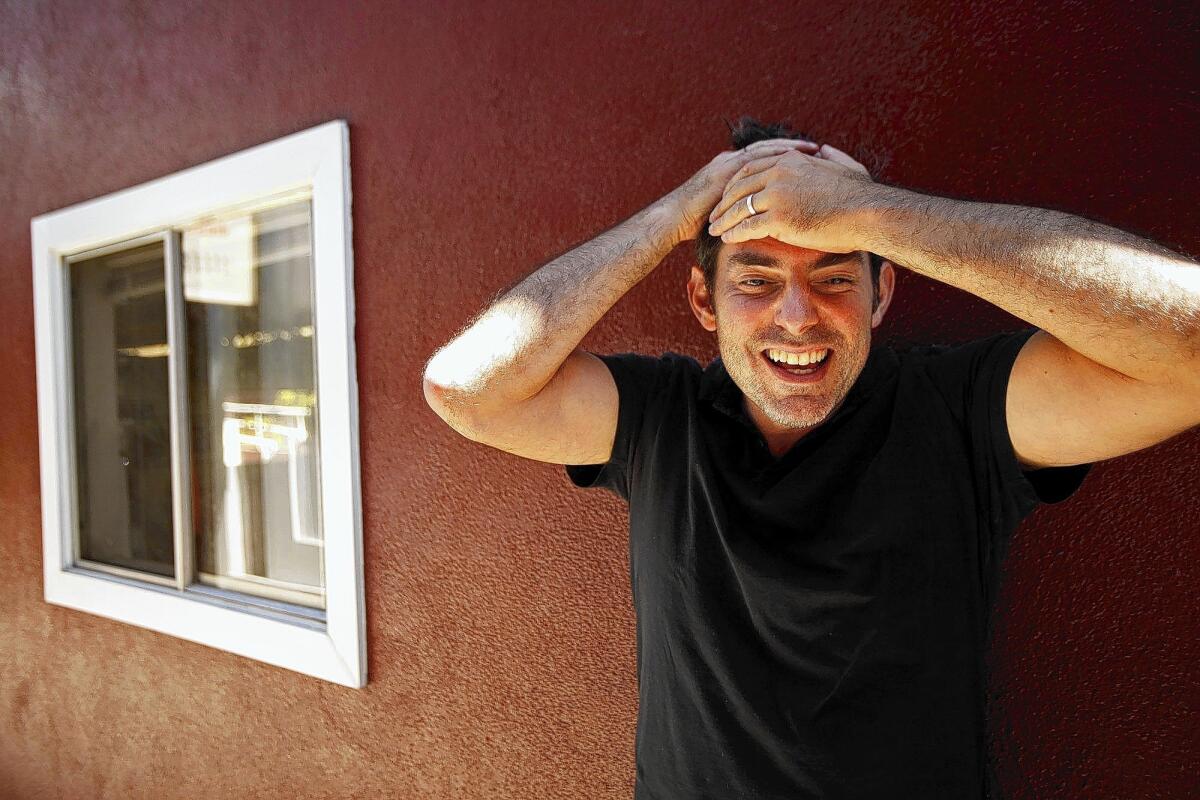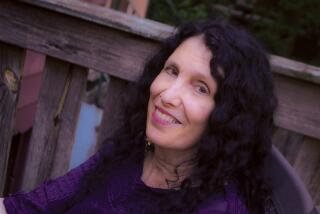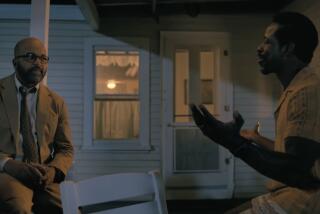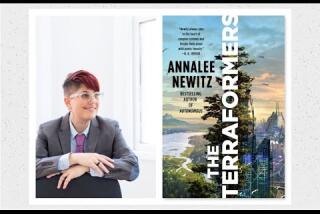Chris Weitz talks about his YA novel, ‘The Young World’

- Share via
“I write lying down — much like Marcel Proust. The only thing I have in common with him,” Chris Weitz says, laughing.
Known as a director and screenwriter, Weitz has just published his first novel, “The Young World” (Little Brown: 384 pp, $19), a YA thriller set in a dystopic Manhattan. “It’s a lot less recursive and reflexive than Proust,” he notes. “There’s a higher body count.”
In his book, a virus has wiped out all the adults and small children, leaving only teens. The survivors have formed regional tribes; the one based in Greenwich Village is led by slightly uptight teenager Jefferson and the sassy girl he pines for, Donna. The two tell the story in alternating chapters.
“I believe in the Society of Mind Theory,” Weitz says, citing neurologist Marvin Minsky. “When you’re writing characters, I think you’re trying to emulate different people in different facets of yourself. So somewhere in me is a teenage girl just waiting to get out.”
This seems a little incongruous for the 6-foot-tall Weitz, but he’s been able to tap into teen emotions before. There was “The Twilight Saga: New Moon,” which he directed; the drama “A Better Life,” about an undocumented immigrant father and his teen son; and 2002’s “About a Boy,” the film he co-wrote and directed with his brother, Paul.
Weitz, who has a degree in English from Cambridge University, says, “I always thought I’d do something to do with books. My first job out of college was reviewing books. And I’ve adapted a lot of books into films. Movies were a way for me to deal with my love of books, and how I was going to stay in that world.”
After directing so many films featuring teens and young people, Weitz was deluged by young adult books and scripts for possible projects. “Lots of them were great,” he says diplomatically, “but I thought, maybe I should try this.”
In “The Young World,” Donna, Jefferson and other members of their diverse tribe set out across Manhattan to try to understand what’s gone wrong, encountering a gantlet of cruel private-school boys, canny subway dwellers and cultish cannibals. You could call it “The Warriors” meets “Logan’s Run” meets the 1966 Star Trek episode “Miri.” There are piles of film referents, many of which appear unabashedly in the text. The characters even power up a precious generator so they can watch “Star Wars Episode IV: A New Hope” together.
His affection for science fiction goes way back: Weitz, 44, is so steeped in “Star Wars” that, sitting in a Santa Monica restaurant, he describes the killing of Luke’s aunt and uncle as “my death of Bambi’s mother — it was very distressing to me. They’re smoking skeletons.” As someone who understands the mechanics of narrative, he adds with a chuckle: “But it had to be done.”
That’s because the idea of the hero as orphan is so mythically powerful. “That is kind of the fairy-tale idea writ large,” Weitz says. While he was writing the book, Weitz was working on a project based on another classic fairy tale: the screenplay of “Cinderella” for Disney. “It was a little difficult at times to switch between writing ‘Cinderella’ one day and then post-apocalyptic teens the next,” he admits.
While there are plenty of musician-slash-novelists, only a handful of film directors write fiction. What it takes to run a blockbuster production may be at odds with the solitary writer’s life.
“Frankly, you get spoiled when there are 60 or 70 people helping you do what you’re trying to do,” Weitz says. “You don’t get that [writing books]. Just you and the computer.”
Weitz comes from a showbiz family: His grandfather was an agent, his grandmother, the 104-year-old Lupita Tovar, starred in Spanish-language movies in the 1930s. His mother, Susan Kohner, earned an Oscar nomination for her role in “Imitation of Life.” She raised her children in New York City. Its landmarks — Central Park, the zoo, the public library with its lions out front — feature prominently in this novel.
“I spent oodles of time in the main branch [of the library]. I love it so much,” he says. In tribute, he’s cast it and the rest of the city in a state of early exquisite decay. Grand Central is there but changed; art can still be found at the Metropolitan Museum, but so can destructive new inhabitants.
In “The Young World,” there are brutal fights and genuine threats of violence. After finding some of the dystopian books he’s read to be “a bit glossy,” Weitz created “a world with some ugly things happening in it.”
The recommended age is 15 and up — a little older than your average YA novel. By that age, he says, “kids have contemplated these things — sex, death, money, power — already, whether or not they’re talking about it.”
His book includes drugs and drinking, exploitation and the implication of rape. “It’s funny to talk about writing realistically about teens in a sci-fi setting, but I did want their behavior to be believable,” he says. “The fact that this is a world in which rape happens is a little concerning. … but — Steubenville,” alluding to the 2012 rape case involving two high-school football players and several onlookers.
It’s not just that terrible incident that was on Weitz’s mind when he was writing: He saw positive aspects of contemporary society too. “My story is probably more inspired by Occupy Wall Street or Zuccotti Park or Burning Man,” he says.
From those movements he took the ideas of self-sufficiency, creativity and the effort to create a society from scratch. Weitz attended Burning Man, the anarchic desert arts festival, for more than a decade; it’s where he met his wife, Mercedes Martinez.
Weitz will write two more books — “everything has to be a trilogy now,” he says — and films will follow. Warner Bros. picked up the rights to “The Young World” in June.
“I just try to keep on doing different things,” Weitz says. “Which in a way is a stupid idea because the people who ... are well-regarded are people who do the same things over and over again.”
Like passing notes in class; I’m @paperhaus on Twitter
More to Read
Sign up for our Book Club newsletter
Get the latest news, events and more from the Los Angeles Times Book Club, and help us get L.A. reading and talking.
You may occasionally receive promotional content from the Los Angeles Times.









